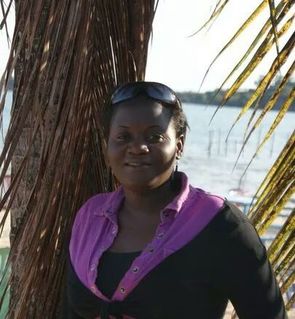
Joannie’s Story

Joanne lost her parents at a young age and grew up with her many siblings in Uganda. She met her husband, Paul, when he was volunteering in her community and they now live together in the UK with their two lovely children. Joanne has been advising Irise on how to support Ugandan adolescent girls for many years and now sits on our UK board.
By the time I started my menstrual life, I had lost my father and mother. This meant that I had lost the only person, mum, who could have sat me down and told me about all the changes in my body. She had been a village nurse hence she would have been in position to explain so many things. In Uganda, it is considered a very private matter and you cannot ask anyone about it. I was not close enough to any of my older sisters to talk about this.
Here I was with all these questions about the changing body and with no qualified person to help me work out which of the theories I was hearing were correct. I remember the first time I had menstrual period pain, I still remember it so clearly. My older sister ran to our elderly lady neighbour who supplied herbs to the whole village. She ‘examined’ me and deduced that I was about to experience change, and she was right. She also told me that I was not allowed to take any pain killers because no one is allowed to interfere with the natural process. The pain being natural, I had to bear it. She said my body was getting ready for a process, without telling me what the process was. I was not supposed to mention it to anyone because of fear of being bewitched and I believed her. I was young and scared.
Not having parents meant no financial support which had many implications including changing schools and not affording basic needs. My new school had no toilets – just pit latrines. We used to have five to six students to a desk, boys and girls sat together. With the dawn of every single period; the heat, the sitting arrangement, the lack of proper washing facilities, the lack of sanitary pads, and the anxiety and self-consciousness made me feel like I was in prison, a monthly prison. It got worse with irregular periods. Some of my friends who walked for miles to come to school had to miss school and eventually failed exams.
We used to use old t-shirts and other cotton fabric as sanitary towels. Changing and reusing them was impossible. It was unsustainable given the lack of facilities to wash and dry these materials at school. It was daunting to carry the used material in a school bag on a warm sunny day, which was almost every school day. Other girls use dried maize cobs as tampons, toilet rolls, absorbent leaves, and more. Some choose to not bother going to school at all, especially those whose periods lasted longer usual. The shame of blood leaking through your skirt, boys calling you names, sores and infections, to mention but a few, makes you hate being a young healthy woman.
For many girls in Uganda and other developing countries, there is a monthly prison: that time of the month where they regret being young and healthy because they cannot afford basic needs. This is a form of poverty, a form that deprives girls of education because they have to miss school. To most of these children, as it was for me, education is the only way out of the vicious cycle of poverty since they do not have inheritance or welfare systems to bail them out in the future.
I now live in the UK and I marvel at how readily available sanitary pads are, how much choice there is and how most people can afford them. Not long ago, a group of us from the UK went to Uganda, my home land and, using Irise International’s menstrual education material, we were able to speak with the community about menstruation. I was so happy to share this with them and to empower them to escape the fear and worry that used to come with every period.



No Comments